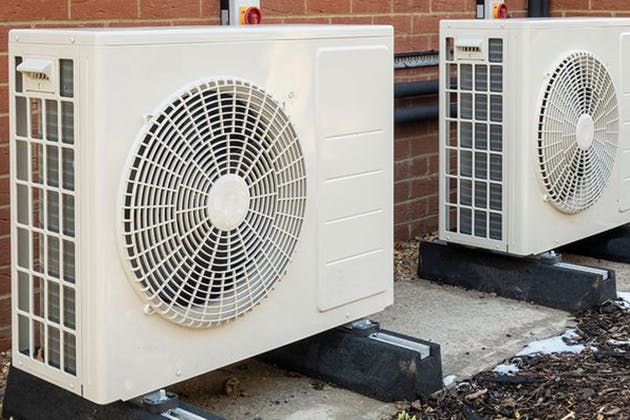When it comes to heating and cooling your home efficiently, air source and ground source heat pumps are common choices. However, understanding the distinctions between them is critical to selecting the best decision for your home. In this detailed guide, we'll look at the differences between air source and ground source heat pumps and help you decide which one is best for you.

How do Heat Pumps work?
In their most basic form, heat pumps absorb heat from a certain source and convert it to a liquid. This is then compressed even more to raise the temperature before the heat is transferred from the liquid to water, providing warmth to a building (either through radiators or underfloor heating).
With this in mind, the primary distinction between air and ground-source heat pumps is where the heat is drawn from. For example, air-source heat pumps take heat from the air, whereas ground-source heat pumps extract heat from the ground.
This may influence your ultimate decision, as not all properties are equipped to absorb and transfer heat from a ground source.
Differences between air source and ground source heat pumps
Heating Capacity
Another thing to think about is the heating capability of ground- and air-source heat pumps, particularly for homes with particular heating requirements. Larger residences or structures with greater heating needs are better suited for ground-source heat pumps since they typically have higher heating capabilities than air-source heat pumps.
System Lifespan
Planning and investing for the long run requires taking air-source and ground-source heat pump systems' anticipated lifespans into account. Although both types of systems are capable of delivering dependable heating for an extended period, ground-source heat pumps usually have a longer lifespan than air-source heat pumps. Both kinds of heat pump systems can have longer lifespans with proper care and routine repair.
Energy Efficiency
Heat pumps that draw energy from the air or the earth are effective heating devices that can cut energy costs and consumption. The capacity of ground-source heat pumps to extract heat from the comparatively constant temperature of the ground, however, usually gives them a little advantage in terms of efficiency. When compared to air-source heat pumps, ground-source heat pumps can attain greater coefficients of performance (COP), which means they provide more heat output per unit of electricity input.
Installation Costs
In comparison to ground-source heat pumps, air-source heat pumps are typically less expensive initially when it comes to installation costs. The average cost of installing an air-source heat pump is approximately £6,000–8,000, whereas the cost of installing a ground-source heat pump can range from £10,000–£18,000. The primary reason ground-source heat pumps are more expensive is that they require a ground loop installation, which calls for boring holes or excavating trenches for the heat exchange system.
Space Requirements
Installing air-source heat pumps takes up less room than installing ground-source heat pumps. Air-source units take up very little interior space because they are usually installed outside on the outside of buildings. On the other hand, a lot of outside space is needed for the installation of ground loops or boreholes in ground-source heat pumps. Additionally, depending on the location of the property and local laws, excavation for ground-source systems may need planning clearance.
Noise Levels
The operating noise levels of air-source and ground-source heat pumps can differ, which could affect whether or not they are appropriate for residential settings. Ground-source heat pumps are perfect for locations that are noisy-sensitive because they function discretely and silently and don't have any visible external units. On the other hand, residences located in calm neighbourhoods may want to take into account the noise level that air-source heat pumps produce when they are in operation.
Aesthetics
Another thing to think about is how installing heat pumps will look on the outside and landscape of the property, especially for homeowners who care about aesthetics. Ground-source heat pumps provide a covert and unobtrusive heating option because they are installed below and have no apparent outdoor device. Conversely, air-source heat pumps have an external compressor unit that is visible, which could affect how the property looks. To improve curb appeal and overall enjoyment, select a heat pump system that complements the architecture and landscape of the home.
Environmental Impact
Heat pumps that draw energy from the air or the ground both help the environment by cutting down on carbon emissions and the need for fossil fuels for heating. On the other hand, ground-source heat pumps are less detrimental to the environment in terms of aesthetics and noise pollution. While air-source units may produce some noise while operating and have an external compressor unit that is visible, ground-source systems run silently and covertly.

Which Option Is Right for You?
The decision between ground-source and air-source heat pumps is influenced by several variables, such as available space, money, and environmental concerns.
Consider Air-source Heat Pumps If:
There isn't much outside area available for installation.
You prioritize upfront cost savings.
The outdoor unit's noise is not a problem.
Consider Ground-source Heat Pumps If:
There is enough room outside for you to construct a ground loop.
Long-term energy savings and efficiency are your top priorities.
You want your heating system to be more subdued and quiet.
Contact Us for Air Source Heat Pump Installations
Elements Heating Installations can help if you're thinking about installing a heat pump in Milton Keynes, Banbury, Brackley, or any of the nearby counties in Oxfordshire, Northamptonshire, or Buckinghamshire. For further information or to arrange a free consultation, call us at 07875 344794 or 01280 473772, or send us an email at elementsheatinginstallations@gmail.com.



